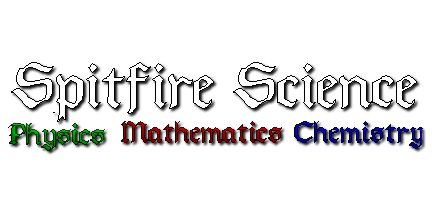

Ø
Site Map
Ø
Spitfire Science Index
Ø
Spitfire Science Index 2
I.
Solve-It Physics
1.
Basic Principles
2.
Conversions
3.
Conventions and Symbols
4.
Units and Conversion Factors
5.
Useful Constants
6. Classical Physics
A.
Kinematics
a.
Average Velocity
b.
Gravity at Work
i.
End of Semester Insanity (Easy)
c. Kinematic Answers
7. Modern Physics
8. Nuclear Physics
9. Optics
10. Electronics
11. Intermediate Theoretical Physics
12. Electricity & Magnetism
13. Mechanics
14.
Thermodynamics
II.
Solve-It Chemistry
1.
Periodic Table of Elements
2.
General Chemistry I
A.
Elements & The Periodic
Table
B.
Compounds
C.
Mixtures
D.
Three Basic Laws
E.
Atomic Theory According to
F.
Symbols
G.
Formulas
H.
Equations
I.
Atomic Mass
J.
Reactions
K.
Ionic Compounds
L.
Molecular Compounds
M.
Nomenclature
a.
Solving Inorganic Nomenclature Problems
b.
Rules for Naming Inorganic Compounds
c.
A Flowchart for Naming Inorganic Compounds
d.
Practice Naming Inorganic Compounds
3.
General Chemistry II
4.
Organic Chemistry I
5.
Organic Chemistry II
6.
Analytical Chemistry
7.
Physical Chemistry I
8.
Physical Chemistry II
III.
Solve-It Mathematics
1.
Basic Algebra
2.
Intermediate Algebra
3.
College Algebra
A.
Solving Systems of Equations
a.
Systems of Two equations
b.
systems
of Three equations
c. systems of Four equations
d.
Non-linear Systems of Equations
4.
Trigonometry
5.
Calculus I
6.
Calculus II
7.
Calculus III
8.
Differential Equations
9.
Linear Algebra
A.
Solving Systems of Equations
a.
Systems of Two equations
b.
systems
of Three equations
c. systems of Four equations
d.
Non-linear Systems of Equations
IV.
Bibliography
V.
Contributors to the Cause
© 2006, Spitfire Science

This work is licensed under a Creative Commons Attribution-NonCommercial-NoDerivs 2.5 License.